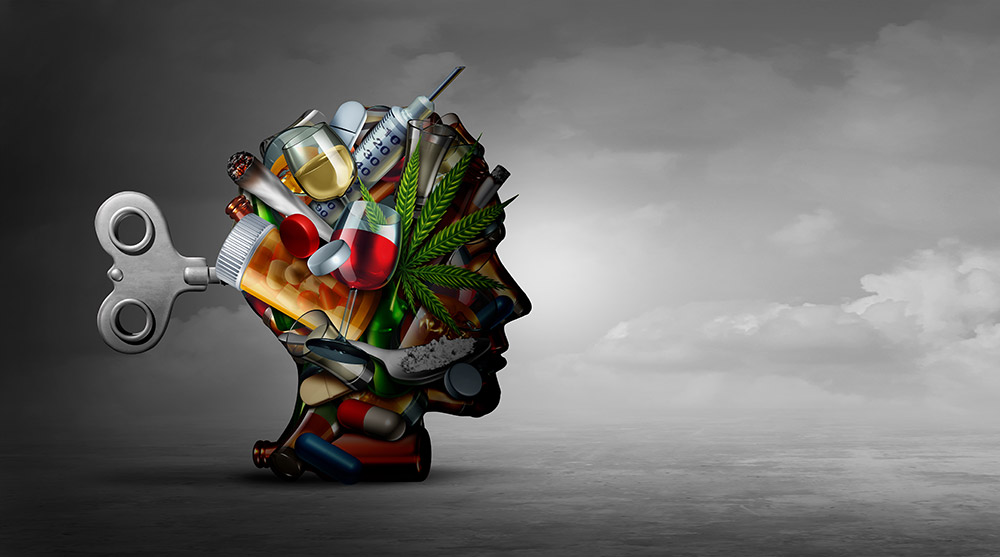Drug Addiction & Abuse
Recognising the signs and symptoms of drug addiction will help you seek the appropriate treatment or provide a loved one with the necessary support. Understanding the differences between drug addiction and abuse can help you take steps toward drug rehabilitation and recovery. We look at the most common drug dependencies and the effects of addiction on individuals and families.
What is drug addiction (Substance Use Disorder)?
Drug addiction is also known as substance dependence or a substance use disorder. It is characterised by an impulse to use a drug or multiple drugs, regardless of its impact on health, relationships, career prospects, and legal consequences.
Drug dependence causes changes in mood, personality, and physical well-being. Individuals will continue to rely on the substance of choice regardless of the risks.
Drug addiction is not only about illicit drugs such as cocaine, heroin, or cannabis. Individuals can also become addicted to prescription drugs.

Drug addiction vs. abuse
Drug dependence and drug abuse are frequently confused, but according to the Diagnostic and Statistical Manual of Mental Disorders (DSM), drug addiction involves the use of a substance with damaging effects on physical health, personal relationships, and professional life. It is described as causing poor management of responsibilities, legal problems resulting from drug use, and causing harm to others while under the influence.
Drug addiction is an inability to quit using the substance on your own and the experience of withdrawal symptoms with reduced consumption or the elimination of drug use. Changes in personality, concealing behaviours to use drug, continuous intoxication, and failed attempts to quit are part of drug dependence.
Drug abuse however, does not always lead to addiction. Individuals can abuse drugs (including alcohol) on a weekend, or at a party without having the deep psychological attachment to drugs that come with addiction. You or someone you love may abuse drugs under these circumstances, but continue to maintain healthy relationships with others including work and financial commitments.
However, if you are preoccupied with thoughts of taking drugs, or feel like you need to take drugs to feel ‘normal’, these could be signs of dependence developing.
In the UK, Class A drugs consisting of LSD, ecstasy, meth, heroin, and cocaine are among the most dangerous and controlled under the Medicines Act, known as ‘controlled drugs.’ Medicinal cannabis, codeine, amphetamine, and barbiturates are Class Be drugs and can be legally prescribed by a physician (Drugwise).
Common drug addictions
Most are familiar with illicit drug addictions; however, the prevalence of prescription drug addiction is on the rise. People with chronic conditions and who are taking prescription medication are at risk of dependence. We look at the most common types of drug addictions.
Stimulants
Stimulants consisting of cocaine, crack cocaine, amphetamines (speed), crystal meth, and prescription medication such as Ritalin, are commonly referred to as ‘uppers.’ This class of drugs increases the activity of the nervous system creating heightened energy, euphoric, and performance-enhancing effects (American Addiction Centers).
These types of substances work by boosting dopamine levels in the brain for short periods. This reinforces the connection between the substance and its pleasurable influence. Caffeine is a stimulant that causes sensations of shakiness, an inability to sleep, and difficulty sustaining focus when consumed in large amounts.
Depressants
A depressant is a substance which causes the brain and the central nervous system to slow down, alcohol addiction and benzodiazepine addiction are forms of depressant addiction. This leads to reduced stimulation and awareness but also feelings of relaxation and decreased inhibition. Individuals who come off alcohol and benzodiazepines often feel depressed owing to the effect it has on the brain and body.
When depressants are consumed in large quantities and over a significant period it can create an addiction. Quitting the use of these substances can lead to drowsiness, vomiting, low blood pressure and life-threatening circumstances (ADF Alcohol and Drug Foundation). To manage the effects of a depressant requires the support of a GP or medical professional.
Cannabis
Cannabis is a plant that is used both recreationally and as a medicinal substance. Cannabidiol or CBD has grown immensely in the wellness market for its health benefits. It is THC that maintains cannabis’ illicit drug classification. THC or tetrahydrocannabinol is the cannabis compound responsible for its intoxicating effects or experience of a “high.” It creates a state of euphoria, drowsiness, and distorted perception while increasing pleasurable effects in the brain. It is this connection that often leads to a cycle of cannabis addiction.
As cannabis is a widely used and available substance in the UK, its potential for dependency is high. Individuals use the drug socially and recreationally by smoking, vaping, oils, or edibles.
Hallucinogens & dissociatives
Hallucinogens and dissociatives are substances such as LSD, Ketamine, and mushrooms. When intoxicated, it causes a major distortion in perception. These types of drugs are also known to cause emotional disturbances, visual, sensory, and audio hallucinations, and mood imbalances.
Studies concerning the way these drugs work on the brain and the body are ongoing. Its effects are not largely understood but researchers believe that it is responsible for causing a disruption in neurotransmitter communication in the brain (NIDA).

Opiates and Opioids
Opiates and opioids include heroin, morphine, fentanyl, codeine, and methadone. These are highly addictive substances that can be dangerous when used as recreational drugs.
Codeine and morphine are further examples of substances commonly used as prescription medication; however, these carry risks when abused.
Many types of pain-relief medications consist of opioids. These substances relieve pain but in high doses can increase drowsiness, slow heart rate, and lead to death (Mayo Clinic). Opioids can create feelings of deep relaxation and sleepiness while creating pleasurable effects in the brain. This leads to higher rate of use and the risk of dependency.
The Dangers of Opiate Substitutes
When individuals facing a heroin addiction seek treatment, substitute opiates such as methadone are used to support withdrawal. Unfortunately, these substitutions carry a high risk of mortality in individuals with opioid dependence during and after treatment (PubMed). This is owed to greater use of substituted substances during follow-up treatment. It simply maintains the cycle of dependence as it fails to address the underlying issues for addiction.
How drug addiction develops
Harvard Health Publishing describes addiction as using a substance to relieve feelings of discomfort and trauma, both physical and emotional. There is less emphasis on pleasure-seeking habits and more focus on addressing the underlying reasons for the development of addiction during treatment.
We explore the possible causes for developing drug dependency.
Repeat exposure
There is a higher risk of developing a drug dependence when taking the drug more frequently (repeat exposure) create tolerance of the drug. Larger quantities of the substance must be used to achieve the same effect which places individuals in a very risky position for drug addiction (Science Direct).
While there is correlation between tolerance and addiction, having a higher tolerance to something does not necessarily mean you or someone you love has an addiction. Tolerance is a normal physiological response to all substances (including medication).
Trauma & mental health
When individuals suffer a past trauma such as sexual abuse, domestic violence or even the loss of a loved one, there is greater need to escape or conceal difficult emotions and memories and less able to cope with the reality of the trauma. When relying on substances to hide or relieve the emotional difficulties, it can reinforce the connection between hiding the trauma and using the drug. Many people who have suffered a trauma may be struggling with mental health conditions such as depression and anxiety, further increasing the risk for dependence. Where a substance dependence and a psychological condition are present, it is known as a dual diagnosis.
A family history of drug use
Many individuals who struggle with addiction have followed a similar path to that that their parents have battled. The ongoing debate surrounding genetic vs environmental factors suggest that both may play a role in advancing an addiction.
An average 40 to 60% of individuals who had parents or grandparents with an addiction are at risk of developing a dependency themselves (Psychology Today). These percentages are higher for individuals managing depressant and opiate addictions.
Signs & Symptoms of Drug Addiction
A drug addiction is characterised by a distinct group of signs and symptoms:
- The experience of withdrawal when reducing or stopping the use of the drug
- A lack of interest in personal responsibilities, relationships, and professional life
- Remaining under the influence at all hours of the day
- A persistent need to have the substance and use no matter the risk
- Trouble with the law, self-harm, and difficult, often abusive relationships.
Diagnosing drug addiction
The CAGE questionnaire is a medical screening tool that doctors use when assessing individuals for an addiction, primarily an alcohol dependence (Healthline). The CAGE stands for four questions including:
- Have you thought to CUT down substance use?
- Have people ANNOYED you by talking about your substance use?
- Have you felt GUILTY about using?
- Have you used first thing in the morning or to ease your nerves? (EYE-OPENER)

The dangers of drug addiction
The persistent use of drugs has a detrimental effect on mental, emotional and physical health. It’s negative impact is also experienced in professional life, relationships, motivation, and social life. Intoxicating effects associated with many types of drugs make it hard to sustain focus, affects mood, and can alter perception. As the drug causes chemical changes in the brain, it influences the way the central nervous system works.
Slowed responses, brain fog, shakiness, speech difficulties, and slower response rates are all part of its side effects. Along with functional symptoms, the addiction can cause cirrhosis of the liver and advanced kidney failure. The body is simply unable to cope with metabolizing the harmful toxins which affects internal organs.
Drug use in pregnancy
Drugs including alcohol are known to cause birth defects and cognitive problems in developing babies. Most babies are born addicted to the substance upon birth and have to undergo a painful withdrawal. Pregnant women are also at higher risk of suffering a miscarriage with continued drug use.
Prenatal effects including birth defects are commonly associated with cocaine, heroin, cannabis, MDMA, methamphetamine, and prescription drugs.
Crack cocaine is known to cause mental and physical health problems in babies. Alcohol is primarily responsible for foetal alcohol syndrome which causes both mental and physical deformities.
If you are pregnant and struggling with drug use, seeking medical care is imperative for the safety of you and your baby.
The Impact of drug addiction on family
The Guardian has revealed that rising numbers of addictions and its impact on the family are costing the NHS an average £500 million a year. In England, alcohol addiction is responsible for an astonishing £3.5 billion in NHS services. This includes the provision of treatment and social intervention.
Substance use disorders and employment
Owing to the psychological and the physical effects of a substance use disorder, it becomes impossible to pursue career goals or maintain a stable employment. For those who get into trouble with the law, a criminal record citing drug use can hinder future job opportunities leaving many individuals in financial dire straits.
Is Drug Addiction a Disease?
Drug addiction is a disease. The focus of addiction today is slowly shifting from a need for pleasure and its ‘ups’ or ‘highs’ but rather on the underlying psychology that is responsible for maintaining the addiction.
Research from the NIAAA suggests that substance use disorders and both anxiety and mood disorders are widespread among the population. According to studies, psychologists and psychiatrists are looking at psychological disorders such as depression as occurring first or from a lifetime of symptoms and then leading to a substance abuse and dependence disorder.

Getting Help for Drug Addiction
There are many types of treatment options for overcoming a drug addiction. It starts with making the decision to want a sober future. Private rehab facilities are available which include medical detox. Both inpatient and outpatient facilities offer addiction counselling with access to support groups such as NA and CA. Treatment for drug addiction typically starts with a drug detox followed by therapy.
If you are struggling with the difficulties of an addiction, we are here to help you along your journey.
Please feel free to call us if you have any questions about the next steps in your path to freedom, balance and wellness.
